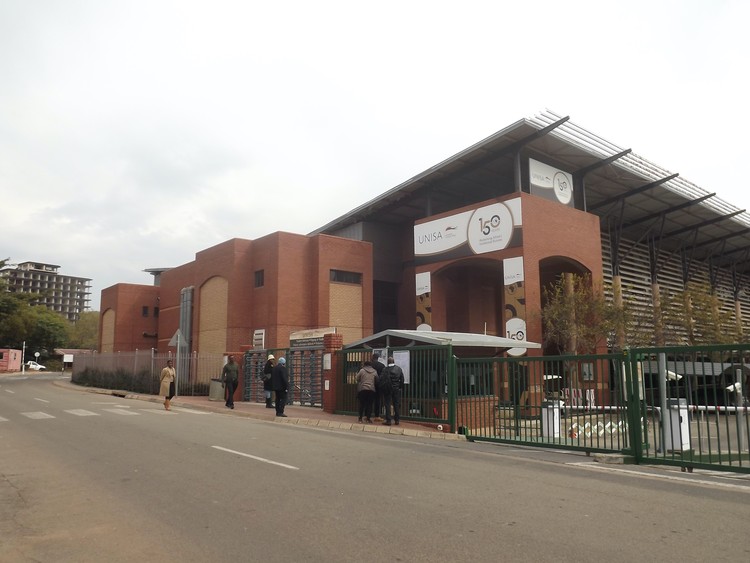UNISA campus closed due to water quality concerns in Tshwane
Water is discoloured due to sediment, says City
UNISA’s Sunnyside campus has been closed since 7 June because of concerns over discoloured tap water. Photo: Warren Mabona
- The University of South Africa’s Sunnyside campus in Tshwane has been closed since 7 June because of concerns over water quality.
- The university said staff had been advised not to drink from the taps after the water turned brown.
- The City of Tshwane say the problem was caused by sediment and had been resolved.
- But this week the campus was still closed.
The University of South Africa (UNISA) Sunnyside campus has been closed since 7 June because of dirty tap water in Tshwane. The campus was closed as a precautionary health and safety measure after the water turned dark brown, the university said.
“The quality of water at our Pretoria campuses is of concern at the moment,” said UNISA in a statement sent to GroundUp by senior media officer Tommy Huma.
“In many cases, it is dark brown water. As a precaution, management resolved that all members of staff not drink water from our taps until further notice. An external service provider has been appointed to test water for various bacteria, including cholera at the municipal inlet point, our reservoir and the water line supply to the buildings and taps. The test results will be available in ten days.”
UNISA apologised to students for the inconvenience caused by the closure of the campus.
In a statement about the water on 3 June, the City urged consumers to boil and filter water before drinking it.
Fears about water quality have mounted with the death of 29 people from cholera in Hammanskraal, north of Pretoria. The South African Human Rights Commission (SAHRC) noted in 2021 that the dams that provide drinking water for the capital are polluted by sewage due to failing sewage treatment works run by the City of Tshwane.
The SAHRC said residents had complained about “receiving dirty and foul smelling water”. The complaints had been laid as far back as July 2018.
City spokesperson Lindela Mashigo told GroundUp that the discoloured water in parts of Sunnyside, Arcadia and surrounding areas was the result of sediment.
“The incident was caused by sediments at the bottom of the reservoir servicing these areas, which had run critically low after the loss of pressure from Rand Water supply,” said Mashigo.
Mashigo said the matter had since been resolved but did not provide further details. Nor did he answer GroundUp’s other questions.
When GroundUp visited Sunnyside and Pretoria inner city on 12 and 13 June, businesses and government departments were operating as usual.
Jimmy Idris, who runs a hair salon on Robert Sobukwe Street in Sunnyside, said he was using and drinking water as usual but he was worried. “The City of Tshwane must investigate this problem and tell us whether our water is safe or not,” he said.
Keo Mokgoetsi, a student, said UNISA should have used its resources to keep the campus open, especially during the June exam period.
Support independent journalism
Donate using Payfast

Don't miss out on the latest news
We respect your privacy, and promise we won't spam you.
Next: Hundreds march to Gugulethu clinic demanding better service
Previous: Some crèches never got the promised Covid relief funds, and now it’s too late
© 2023 GroundUp. This article is licensed under a Creative Commons Attribution-NoDerivatives 4.0 International License.
You may republish this article, so long as you credit the authors and GroundUp, and do not change the text. Please include a link back to the original article.
We put an invisible pixel in the article so that we can count traffic to republishers. All analytics tools are solely on our servers. We do not give our logs to any third party. Logs are deleted after two weeks. We do not use any IP address identifying information except to count regional traffic. We are solely interested in counting hits, not tracking users. If you republish, please do not delete the invisible pixel.

